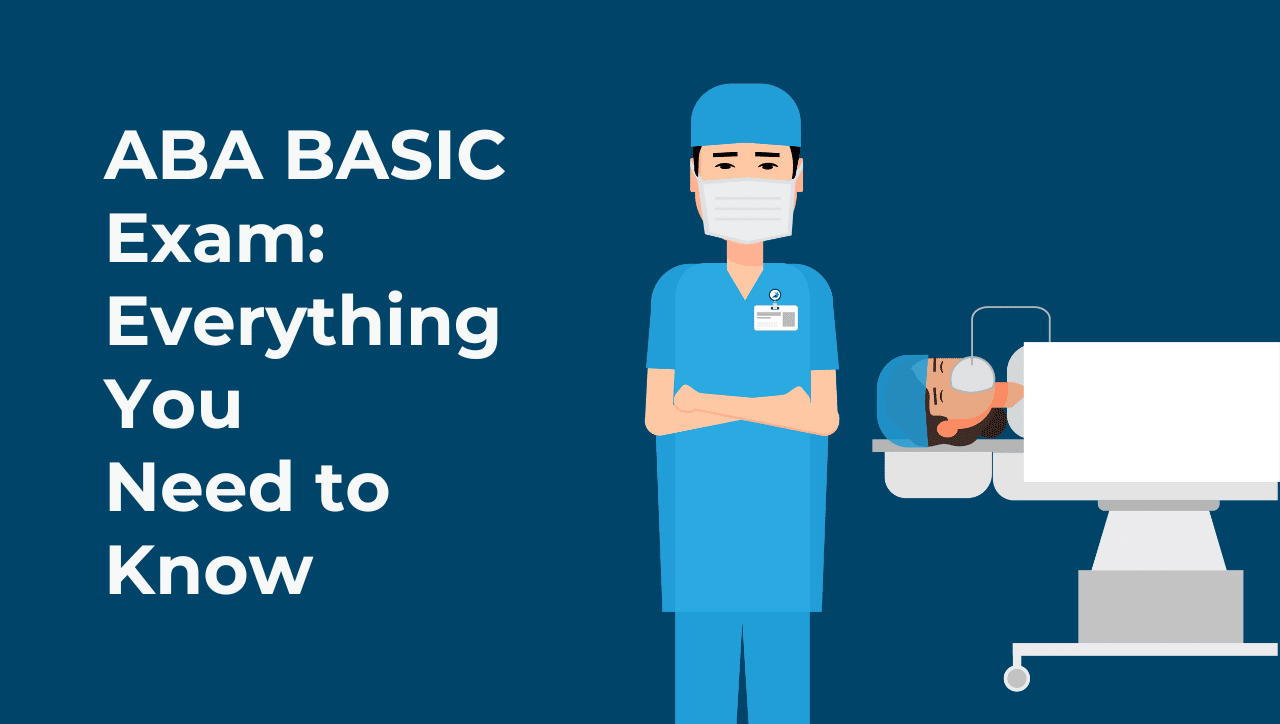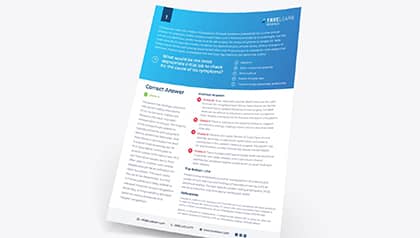Everything You Need to Know about the Anesthesia ITE
The American Board of Anesthesiology (ABA) mandates that anesthesiology resident physicians across the United States complete an annual in-training examination (ITE). The purpose is to prepare residents for the ABA written board examinations: the BASIC and ADVANCED exams. Here’s what residents need to know about the Anesthesia ITE.
What is the ABA ITE?
The ABA ITE is an exam administered annually to anesthesiology residents nationwide. It is a standardized, scaled-score exam to assess clinical competency. Each scaled score correlates to a percentile weighted against the score of other residents in the same post-graduate year. In addition, some fellowships may request the most recent ITE score as a means of objectifying applicants.
The Anesthesia ITE results differ from the BASIC, ADVANCED, and APPLIED exams as it is not a pass-fail exam and measures a resident’s progress throughout the program. Below are descriptions of each required exam for board certification.
BASIC exam: Taken at the end of the first year of residency in a Clinical Anesthesia program, it is mandatory for a resident to pass this exam. It tests residents on the scientific basics of pharmacology, physiology, anatomy, and anesthesia equipment and monitoring. It is 200 questions and is 4 hours long.
ADVANCED exam: This exam is taken after completing residency and passing the BASIC exam. It measures clinical aspects of the practice and assesses the mastery of the four years of full-time residential training. It is also 200 questions and 4 hours long.
APPLIED exam: The APPLIED exam is taken after passing the ADVANCED exam and has two parts: a Standardized Oral Exam (SOE) and an Objective Structured Clinical Examination (OSCE). In the SOE, examinees will participate in two 35-minute sessions where they will be evaluated on their judgment, adaptability, organization, and presentation skills. In the OSCE, they will be judged on communication, professionalism, and technical skills in seven 8-minute stations with various scenarios.
Anesthesia ITE Format
The ITE is structured as a computer-based examination of 200 multiple-choice questions administered over a 4-hour time period at a site designated by each residency training program. These questions are described as A-type items: questions that are single best-answer multiple choice requiring critical thinking rather than simple recall.
Some of these questions include a clinical vignette while some are more direct. Meanwhile, part of the ITE will include images such as an ECG or x-ray for the examinee to interpret. The examination covers a mixture of 50% basic and 50% advanced topics in anesthesiology. These topics are divided according to the ITE Blueprint published by the ABA.
- Basic topics include anatomy, anesthesia delivery devices, mathematics, pharmacology, regional and general anesthesia, and organ-based sciences
- Advanced topics include anesthesia delivery devices, special techniques, disease states, clinical subspecialties, and issues in anesthesiology.
Why Your ABA ITE Score Matters
ITE score reports typically come out 6 to 8 weeks after the exam. Since each ITE score is weighted against examinees in the same post-graduate year, ITE results are reported as a scaled score on a Personal Performance Report. This scaled score correlates with a national percentile based on the examinee’s post-graduate year, demonstrating a resident’s success in the program.
The Personal Performance Report includes personalized feedback, a percentage score for basic items, and a percentage score for advanced items along with their respective percentile correlations. Additionally, the examinee will receive data on their score in the following categories: basic sciences, clinical sciences, organ-based basic and clinical sciences, clinical subspecialties, and special problems or issues in anesthesiology.
Overall, the Personal Performance Report can help examinees determine their strengths and weaknesses in order to study and improve their skill sets and knowledge.
Gaps in Knowledge Report
For further clarity, there’s also an annual ABA “Gaps in Knowledge Report” documenting select topics that were most misunderstood by examinees or proved to be particularly difficult.
Even so, preparing for the ITE is not a task that should be taken lightly—ITE scores are important. Not only does it help programs track a resident’s progress from start to finish, but success on the ABA ITE has been found to correlate with success on the written board examinations.
Final Advice Before You Take the ITE
1. Know Your Foundations
Apart from a few additions and improvements each year, the ITE covers the same content each time you take it. Thus, it is imperative to become most familiar with the foundations of anesthesiology. Each resident may have their preferred source, but whether it is Miller’s Basics of Anesthesia or Morgan and Mikhail’s Clinical Anesthesiology, these books provide a good summary of the exam content. For a specific outline on the exam, see the ABA’s Content Outline.
2. Apply and Test Your Knowledge
The best way to study for a standardized exam is through an active study method that mimics the exam format. For example, many residents rely on TrueLearn’s Anesthesia ITE question bank, which includes over 1,150 ABA-style practice questions with detailed explanations as well as an add-on predictive assessment 150-question exam. These questions are written by physicians and content experts most familiar with the exam. This ensures the questions are medically accurate, representative of the exam style, and help you gauge how you’ll perform on test day. Furthermore, the question bank is undergoing constant innovation through user feedback and mapping according to the ABA ITE Keywords and Content Outline. It also offers real-time benchmarking to compare your performance to that of your peers on a national level.
3. Repetition is Key
Part of being a medical professional is to strive to learn more and provide the best for your patients. The ABA uses standardized exams like the ITE to objectively incentivize and assess your mastery of medical information as a provider. While this can be anxiety-provoking, repetition when studying and test-taking helps familiarize the examinee and improve performance.
Since the ITE covers practically the same content each year, you can prepare by regularly reviewing notes on the foundations of anesthesiology and its subspecialties and studying practice questions regularly. To walk calmly and confidently to the test center on exam day, get started with TrueLearn’s set of ABA ITE Sample Questions.


